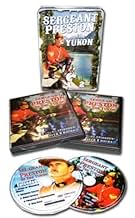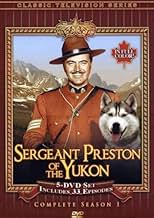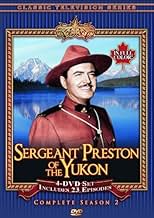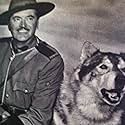Canadian Mountie Sgt. Preston patrols the wilds of the Yukon with his horse Rex and his faithful dog Yukon King, battling both the elements and criminals.Canadian Mountie Sgt. Preston patrols the wilds of the Yukon with his horse Rex and his faithful dog Yukon King, battling both the elements and criminals.Canadian Mountie Sgt. Preston patrols the wilds of the Yukon with his horse Rex and his faithful dog Yukon King, battling both the elements and criminals.
Browse episodes
Featured reviews
Sergeant Preston Of The Yukon like The Lone Ranger created from the minds of George W. Trendle and Fran Striker was a staple of radio for many years. When series radio was coming to an end, the Sergeant brought his team of huskies led by his lead dog King to television and week and after week for three years kids got snow blind watching those wintry episodes. Of course in the tradition of the Royal Canadian Mounted Police, the sergeant never failed to get his man.
As it was from the folks who gave you the Lone Ranger the show did emphasize clean living and strict family values. Of course what those folks in the frozen north did to get a little comfort on those cold winter nights is best left unsaid.
King was as helpful to Preston as Rin Tin Tin was to Rusty and the rest of the US Cavalry. And during the winter months he was essential. I can't conceive of Richard Simmons ever being forced to eat King as say Polar explorers like Scott, Nansen, Peary, and Amundsen being forced to eat their transportation to prevent starvation.
I may be a bit to jocular and humorous, but Sergeant Preston Of The Yukon was a decent show and for more than just the kid trade. It did evoke some fond memories after seeing some episodes recently.
And still he and Nelson Eddy have in their images set a kind of standard for the men of the RCMP to live up to.
As it was from the folks who gave you the Lone Ranger the show did emphasize clean living and strict family values. Of course what those folks in the frozen north did to get a little comfort on those cold winter nights is best left unsaid.
King was as helpful to Preston as Rin Tin Tin was to Rusty and the rest of the US Cavalry. And during the winter months he was essential. I can't conceive of Richard Simmons ever being forced to eat King as say Polar explorers like Scott, Nansen, Peary, and Amundsen being forced to eat their transportation to prevent starvation.
I may be a bit to jocular and humorous, but Sergeant Preston Of The Yukon was a decent show and for more than just the kid trade. It did evoke some fond memories after seeing some episodes recently.
And still he and Nelson Eddy have in their images set a kind of standard for the men of the RCMP to live up to.
The 78 half-hour episodes of the "kiddie" television adventure series "Sergeant Preston of the Yukon" were originally broadcast on CBS during the 1955 to 1958 broadcast seasons; and in syndication for many years after.
This was one of many transplants to early television from network radio. It was created by George W. Trendle and Fran Striker who also put together both the radio and television versions of "The Lone Ranger" and the radio version of "The Green Hornet".
At a time of look-alike westerns filmed on the back-lots of Hollywood, "Sergeant Preston of the Yukon" offered viewers the white landscape of Canada's Yukon Territory. It was actually filmed each winter in the mountains of Big Bear Lake, in southern California.
Like "The Lone Ranger", each week the story's setting and characters were described by the narrator in the opening credits: "Sergeant Preston of the Northwest Mounted Police with Yukon King, swiftest and strongest lead dog breaking the trail in the relentless pursuit of lawbreakers, in the wild days of the Yukon. Back to the days of the Gold Rush, as Sergeant Preston, with his wonder dog, Yukon King, meets the challenge of the Yukon".
The gold rush he is talking about occurred in the 1890's as Canada's desolate western frontier found itself suddenly occupied by a swarm of gold crazed miners, cutthroats, and tenderfeet. It was up to Sgt. Preston (his first name is never used) to track down thieves, murderers, and claim jumpers. The job left him no time for romance even though his Boston Blackie mustache, red uniform, puffed-out trousers, and DI hat must have driven the ladies crazy.
No doubt the education of baby boomers on NWMP lore was responsible for the successful introduction of "Dudley Do-right" to "Rocky and and His Friends/The Bullwinkle Show" (1959-1964).
Then again, what do I know? I'm only a child.
This was one of many transplants to early television from network radio. It was created by George W. Trendle and Fran Striker who also put together both the radio and television versions of "The Lone Ranger" and the radio version of "The Green Hornet".
At a time of look-alike westerns filmed on the back-lots of Hollywood, "Sergeant Preston of the Yukon" offered viewers the white landscape of Canada's Yukon Territory. It was actually filmed each winter in the mountains of Big Bear Lake, in southern California.
Like "The Lone Ranger", each week the story's setting and characters were described by the narrator in the opening credits: "Sergeant Preston of the Northwest Mounted Police with Yukon King, swiftest and strongest lead dog breaking the trail in the relentless pursuit of lawbreakers, in the wild days of the Yukon. Back to the days of the Gold Rush, as Sergeant Preston, with his wonder dog, Yukon King, meets the challenge of the Yukon".
The gold rush he is talking about occurred in the 1890's as Canada's desolate western frontier found itself suddenly occupied by a swarm of gold crazed miners, cutthroats, and tenderfeet. It was up to Sgt. Preston (his first name is never used) to track down thieves, murderers, and claim jumpers. The job left him no time for romance even though his Boston Blackie mustache, red uniform, puffed-out trousers, and DI hat must have driven the ladies crazy.
No doubt the education of baby boomers on NWMP lore was responsible for the successful introduction of "Dudley Do-right" to "Rocky and and His Friends/The Bullwinkle Show" (1959-1964).
Then again, what do I know? I'm only a child.
"THE CHALLENGE OF THE YUKON", a Radio Series from the fertile program hatchery of Radio Station WXYZ, Detroit, made its debut on February 3, 1938 as a 15 minute installment. The series followed the adventures of one Sergeant Preston of the Northwest Mounted Police and his Horse, Rex and his canine ally, "
Yukon King, the swiftest and strongest lead dog in the North!" It later became a half-hour weekly show on the ABC Radio Network.
It was during this period that the show acquired a regular sponsor in the Quaker Oats Company. It's Quaker that was responsible for the Nations supply of nice, piping hot and wholesome Quaker Oat Meal, as well those two "shot from guns" and ready to eat twins of breakfast, Quaker Puffed Wheat and Quaker Puffed Rice.
Anyone who ever heard one of the shows would not soon forget the excitement generated by one of their radio episodes. There was a certain enchanting and heart-felt spectrum of moods generated in these episodes. The main story lines were propelled forward and necessary exposition was ably handled by the golden voiced narrator. We were bombarded with a variety of rich, image-forming sounds. The wind constantly whistling through the lofty coniferous pines, spruce, balsam and larches, was a constant reminder of the great, snowy wilderness being portrayed.
And that my, dear reader, brings us to a most important element in creating an exciting, memorable drama; be it feature film, television or (especially) radio. That is the music, both themes (sort of the 'Overture' of the radio play) and the incidental music for creating mood and serving as queues for impending action sequences.
Much like the two other highly successful series that came out of WXYZ, Sgt. Preston's "THE CHALLENGE OF THE YUKON" would have a theme culled from the seemingly endless library of Classical Music compositions. They would provide a great list of substantive, charming and memorable fine and adaptable scores. And they all just about all happened to be in Public Domain.
The WXYZ staff had previously chosen the Finale from Rossini's Overture to his Opera, WILLIAM TELL and virtually made it their own as the theme for their own immortal radio series, "THE LONE RANGER". Likewise, when the Masked Man's great,great nephew, Newspaper Publisher, Britt Reid, was in need of a similarly rich and memorable "tune" for a theme, what they pressed into service was Rimzky-Korsakov's The Flight of the Bumble Bee." Hence, it became forever identified with THE GREEN HORNET.
So two good themes were taken, but there were plenty of fish in the sea. What was chosen for "THE CHALLENGE OF THE YUKON", which was officially renamed "SERGEANT PRESTON OF THE YUKON" in 1951, was a lesser known composition by a not as 'famous' composer. It was Nichlaus von Reznicek's overture from his Opera,'Donna Diana'. Once heard it's powerful, lively and triumphant melodies will not soon be forgotten.
As an adaptation from Radio, the TV Series of SERGEANT PRESTON OF THE YUKON made the transition as smoothly as one could hope. The voice over narration was continued, but as you would expect, it was in a slightly diminished capacity; the visual medium being not so demanding as Radio.
Overall, it sounded much like the Radio version had been; what with the ever whistling North Wind, Lead DogYukon King's barking, his sled dog team, Rex his horse and the good Sergeant's frequent shouts of "ON KING!" and "MUSH, YOU HUSKIES!" The choice of the lead to portray the Mountie Sergeant was a crucial one and its selection was well done.
In discharging their duty of auditioning and finding the right man they could't have made a better choice. Tall, burly and broad shouldered Richard Simmons was chosen. (Not that one, who was still in diapers then.) He cut a fine figure in his red tunic, dark blue side-striped pants and Pershing-style brown hat.
Furthermore, and just as importantly, Mr. Simmons sounded like the Radio actor who originated the role. So it was with a rich, baritone that all of the Good Sgt.'s various and oft used commands of, "On King", "Mush You Huskies" and "I arrest you in the Name of the Crown", were heard.
And much like "THE LONE RANGER" TV Series, there was plenty of outdoor shooting to add authenticity to whatever studio and back lot "town" shots that they did. We had thought that it was around Lake Tahoe, on the Nevada-California border that starred and doubled for the Canadian Yukon Territory. But we have since then been informed that it was done a California's Big Bear Lake. (I guess I wasn't far off, but no matter!)
That locale provided a beautiful array of, large, snow-covered expanses of looked like fine skiing country. The location was ringed by great growths of pine forest; giving it an authentic look of the arctic. Later episodes, being filmed in Color, made for an excellent record or even a travelogue for this part of Northern (?) California.
One item that Sgt. Preston retained from his Radio Days was the all important Sponsor. Good, old reliable Quaker Oats. After signing on in the '40's, they continued their association with the show up until the end of the TV run. And it is this that will surely awaken a very fond memory of Sgt. Preston. "And that would be .?", I hear you ask.
Sometime during the run of the TV Series, Quaker offered "inside specially marked boxes" of Quaker Puffed Wheat and Puffed Rice, one special Land Deed to One Square Foot of Yukon Territory. (I tink it wuz 1 foot! Any body 'member dat?) When considered today, the whole body of the Sgt. Preston saga, it appears that he truly made a fine impression in our national psyche as a great, immortal symbol of Law & Order and all that is good in Canada and her Neighbor to the South.
It was during this period that the show acquired a regular sponsor in the Quaker Oats Company. It's Quaker that was responsible for the Nations supply of nice, piping hot and wholesome Quaker Oat Meal, as well those two "shot from guns" and ready to eat twins of breakfast, Quaker Puffed Wheat and Quaker Puffed Rice.
Anyone who ever heard one of the shows would not soon forget the excitement generated by one of their radio episodes. There was a certain enchanting and heart-felt spectrum of moods generated in these episodes. The main story lines were propelled forward and necessary exposition was ably handled by the golden voiced narrator. We were bombarded with a variety of rich, image-forming sounds. The wind constantly whistling through the lofty coniferous pines, spruce, balsam and larches, was a constant reminder of the great, snowy wilderness being portrayed.
And that my, dear reader, brings us to a most important element in creating an exciting, memorable drama; be it feature film, television or (especially) radio. That is the music, both themes (sort of the 'Overture' of the radio play) and the incidental music for creating mood and serving as queues for impending action sequences.
Much like the two other highly successful series that came out of WXYZ, Sgt. Preston's "THE CHALLENGE OF THE YUKON" would have a theme culled from the seemingly endless library of Classical Music compositions. They would provide a great list of substantive, charming and memorable fine and adaptable scores. And they all just about all happened to be in Public Domain.
The WXYZ staff had previously chosen the Finale from Rossini's Overture to his Opera, WILLIAM TELL and virtually made it their own as the theme for their own immortal radio series, "THE LONE RANGER". Likewise, when the Masked Man's great,great nephew, Newspaper Publisher, Britt Reid, was in need of a similarly rich and memorable "tune" for a theme, what they pressed into service was Rimzky-Korsakov's The Flight of the Bumble Bee." Hence, it became forever identified with THE GREEN HORNET.
So two good themes were taken, but there were plenty of fish in the sea. What was chosen for "THE CHALLENGE OF THE YUKON", which was officially renamed "SERGEANT PRESTON OF THE YUKON" in 1951, was a lesser known composition by a not as 'famous' composer. It was Nichlaus von Reznicek's overture from his Opera,'Donna Diana'. Once heard it's powerful, lively and triumphant melodies will not soon be forgotten.
As an adaptation from Radio, the TV Series of SERGEANT PRESTON OF THE YUKON made the transition as smoothly as one could hope. The voice over narration was continued, but as you would expect, it was in a slightly diminished capacity; the visual medium being not so demanding as Radio.
Overall, it sounded much like the Radio version had been; what with the ever whistling North Wind, Lead DogYukon King's barking, his sled dog team, Rex his horse and the good Sergeant's frequent shouts of "ON KING!" and "MUSH, YOU HUSKIES!" The choice of the lead to portray the Mountie Sergeant was a crucial one and its selection was well done.
In discharging their duty of auditioning and finding the right man they could't have made a better choice. Tall, burly and broad shouldered Richard Simmons was chosen. (Not that one, who was still in diapers then.) He cut a fine figure in his red tunic, dark blue side-striped pants and Pershing-style brown hat.
Furthermore, and just as importantly, Mr. Simmons sounded like the Radio actor who originated the role. So it was with a rich, baritone that all of the Good Sgt.'s various and oft used commands of, "On King", "Mush You Huskies" and "I arrest you in the Name of the Crown", were heard.
And much like "THE LONE RANGER" TV Series, there was plenty of outdoor shooting to add authenticity to whatever studio and back lot "town" shots that they did. We had thought that it was around Lake Tahoe, on the Nevada-California border that starred and doubled for the Canadian Yukon Territory. But we have since then been informed that it was done a California's Big Bear Lake. (I guess I wasn't far off, but no matter!)
That locale provided a beautiful array of, large, snow-covered expanses of looked like fine skiing country. The location was ringed by great growths of pine forest; giving it an authentic look of the arctic. Later episodes, being filmed in Color, made for an excellent record or even a travelogue for this part of Northern (?) California.
One item that Sgt. Preston retained from his Radio Days was the all important Sponsor. Good, old reliable Quaker Oats. After signing on in the '40's, they continued their association with the show up until the end of the TV run. And it is this that will surely awaken a very fond memory of Sgt. Preston. "And that would be .?", I hear you ask.
Sometime during the run of the TV Series, Quaker offered "inside specially marked boxes" of Quaker Puffed Wheat and Puffed Rice, one special Land Deed to One Square Foot of Yukon Territory. (I tink it wuz 1 foot! Any body 'member dat?) When considered today, the whole body of the Sgt. Preston saga, it appears that he truly made a fine impression in our national psyche as a great, immortal symbol of Law & Order and all that is good in Canada and her Neighbor to the South.
I happened to tune into the Norm McDonald TV show for the first time last week (9-99). In it someone made a passing reference to Sgt. Preston. (It's how I ended up on the IMDb reading about it and writing this.) A comment I'm sure was not noticed by many. It hit home with me. I used to love catching the re-runs of Sgt. Preston and his dog, Yukon King. I couldn't have been more than 6 or 7 but I loved the show. My memories aren't as clear as BOOKWUS (another commenter), but I would like to compliment BOOKWUS on wonderful and complete comments that really bring the show back into view for us Sgt. Preston fans. Great job and I can't add anything else. I would love to see the show again to see what passed for entertainment to me as a child. The simplicity of old TV is lost now, but man, we were "living".
With these words, Sergeant Preston and his loyal dog, Yukon king always got their man. Played by Richard Simmons, Sergeant Preston patrolled the western reaches of the Canadian frontier in the 1890s. Action and justice in such locales as Yellowknife, Dawson, and Whitehorse were seen each Saturday morning by the same kids who had just finished watching The Lone Ranger and Sky King.
The series episodes featured stories set against the harsh extremes of the Yukon winter and summers in the Canadian Rockies. To match the climate, Preston would trade his dogsled for his horse, Rex. King was along wherever the good sergeant went.
Simmons was the perfect embodiment of Sergeant Preston, the pride of the Northwest Mounted. To this day (despite Due South) when I picture a Mountie......it's always Sergeant Preston. And of those of who watched the show as kids, who can forget that stirring theme music and the words with which Sergeant Preston closed each episode, "Well King, this case is closed."
The series episodes featured stories set against the harsh extremes of the Yukon winter and summers in the Canadian Rockies. To match the climate, Preston would trade his dogsled for his horse, Rex. King was along wherever the good sergeant went.
Simmons was the perfect embodiment of Sergeant Preston, the pride of the Northwest Mounted. To this day (despite Due South) when I picture a Mountie......it's always Sergeant Preston. And of those of who watched the show as kids, who can forget that stirring theme music and the words with which Sergeant Preston closed each episode, "Well King, this case is closed."
Did you know
- TriviaAccording to James Garner in an interview with the Archive of American Television, he and eventual star Dick Simmons were the last two actors up for the role, but he decided to pass to pursue film work.
- Quotes
Sgt. Preston: I arrest you in the name of the Crown.
- ConnectionsFeatured in Les folles années du rock (1973)
- How many seasons does Sergeant Preston of the Yukon have?Powered by Alexa
Details
- Release date
- Country of origin
- Language
- Also known as
- Sergeant Preston
- Filming locations
- Production companies
- See more company credits at IMDbPro
- Runtime30 minutes
- Color
- Sound mix
- Aspect ratio
- 1.33 : 1
Contribute to this page
Suggest an edit or add missing content

Top Gap
By what name was Sergeant Preston of the Yukon (1955) officially released in India in English?
Answer






























